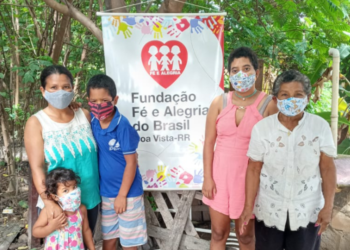
One of the most important goals of Jesuit education is the formation of “men and women for others.” We seek to educate students to live out their Christian faith in service and solidarity with the marginalized and oppressed not only in their own communities, but also throughout the world. As a Spanish teacher at a Jesuit high school, I often reflect on how to practice this mission amid our daily routine and curriculum requirements. I want my students to know that speaking Spanish is not just a marketable skill or an area of study, but a gift that can build bridges across cultures and foster understanding and empathy. The Global Citizen Education initiatives sponsored by Magis Americas have greatly helped facilitate this mission.
I first became aware of Magis Americas and the Jesuit’s global education programs when I, along with two colleagues, led a student immersion trip to Colombia to collaborate with Fe y Alegría in 2019. Our group of ten students met young Colombians who are a part of the Red de Juventudes, a network of community-action groups facilitated by Fe y Alegría. These groups raise awareness about various social issues that directly impact the well-being of their communities. After decades of civil strife in Colombia, these young people want to create a better future for their country. Together we participated in social justice workshops and painted community murals that addressed the need to care for the environment. The students played games to help learn one another’s languages, experienced mass together, and formed friendships. The Fe y Alegría coordinators enthusiastically welcomed us into their praxis and truly exemplified the Universal Apostolic Preferences of Journeying with Youth and Walking with the Excluded.
For my students, the Colombia trip was an eye-opening experience. They witnessed the impact of internal displacement and environmental disasters on the everyday lives of young people their age. They greatly admired the Colombian students’ commitment to justice, and they were inspired to be more engaged with social issues in our own community.
It is often easy for students in the US, especially those who come from middle-class suburban backgrounds, to assume that their way of life is the norm throughout the world, but through their friendships with their Colombian peers, my students learned first-hand that many students lack the access the opportunities that they take for granted. This was especially true with access to educational opportunities. Whereas the US students were confidently planning for college, many of the Colombian students were concerned they would not be able to continue their studies due to enrollment limits.
The experience in Colombia helped them to grow in empathy and solidarity with young people in other parts of the world and fostered an inter-cultural exchange that benefitted both groups of students.
We were looking forward to returning to Colombia in 2020 when the Covid-19 pandemic altered our plans. In the summer of 2020, Fe y Alegría organized their annual meeting of the Red de Juventudes virtually, and we were fortunate to be included. We also met virtually in December of 2020, when our students shared the impact of the pandemic on their education. Our contact with the Red de Juventudes has been entirely virtual for the last year and half, and although we miss the experience of meeting in person, these virtual meetings have enabled us to maintain our relationship with Fe y Alegría until we can hopefully meet again in the future.
Immersion trips are transformative experiences, but they can only accommodate a small number of students. Magis Americas’ La Silla Roja campaign enabled students in all my classes to learn about educational inequities faced by young people around the world without leaving our classroom.
During last year’s campaign, my students researched how the pandemic was affecting education in countries served by Fe y Alegría. We discussed how millions of students are facing more challenges than ever before because of quarantines and in-person closures. Whereas students in our school are equipped with iPads and high-speed Wifi, others lack easy access to technology. For example, my students learned that students often relied on classes transmitted on the radio to continue their education at home. We also discussed how the drop-out rates were exacerbated by the pandemic, especially when students needed to work to help support their families.
In the second part of the campaign, my students were asked to find an individual story that exemplified the issues we had discussed in class. One of my students, Matthew, chose to interview a friend who lives in Venezuela. Her experience of the pandemic was radically different from his own. Matthew expressed to me that he and his friend were able to have a meaningful conversation because of this assignment, and he shared his insights with our class. This experience made the abstract figures and percentages come to life in a tangible way.
This year we are looking forward to initiating the La Silla Roja challenge in September. We are expanding the campaign to more grade levels and are planning an all-school, awareness-raising campaign. The La Silla Roja campaign has brought global issues into my curriculum and exposed students to Jesuit missions around the world. As Ignatian educators, we are called to practice a pedagogy that is not just rooted in the abstract, but also grounded in real contexts and inspires concrete action to make the world a more just place. It is my hope that Magis America’s Global Citizen Education programs, whether they take place abroad or at home, encourage our students to reflect on the meaning of education and seek ways to ensure educational equity for all students.


